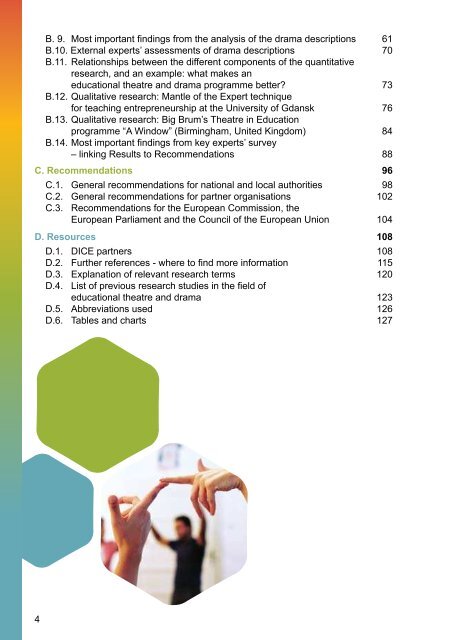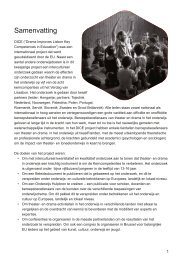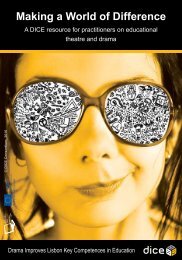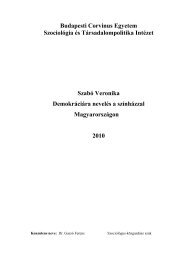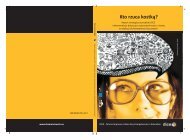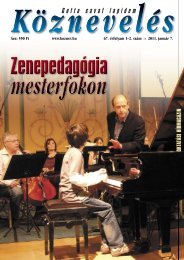Policy Paper - Drama Improves Lisbon Key Competences in Education
Policy Paper - Drama Improves Lisbon Key Competences in Education
Policy Paper - Drama Improves Lisbon Key Competences in Education
Create successful ePaper yourself
Turn your PDF publications into a flip-book with our unique Google optimized e-Paper software.
B. 9. Most important f<strong>in</strong>d<strong>in</strong>gs from the analysis of the drama descriptions 61<br />
B.10. External experts’ assessments of drama descriptions 70<br />
B.11. Relationships between the different components of the quantitative<br />
research, and an example: what makes an<br />
educational theatre and drama programme better? 73<br />
B.12. Qualitative research: Mantle of the Expert technique<br />
for teach<strong>in</strong>g entrepreneurship at the University of Gdansk 76<br />
B.13. Qualitative research: Big Brum’s Theatre <strong>in</strong> <strong>Education</strong><br />
programme “A W<strong>in</strong>dow” (Birm<strong>in</strong>gham, United K<strong>in</strong>gdom) 84<br />
B.14. Most important f<strong>in</strong>d<strong>in</strong>gs from key experts’ survey<br />
– l<strong>in</strong>k<strong>in</strong>g Results to Recommendations 88<br />
C. Recommendations 96<br />
C.1. General recommendations for national and local authorities 98<br />
C.2. General recommendations for partner organisations 102<br />
C.3. Recommendations for the European Commission, the<br />
European Parliament and the Council of the European Union 104<br />
D. Resources 108<br />
D.1. DICE partners 108<br />
D.2. Further references - where to f<strong>in</strong>d more <strong>in</strong>formation 115<br />
D.3. Explanation of relevant research terms 120<br />
D.4. List of previous research studies <strong>in</strong> the field of<br />
educational theatre and drama 123<br />
D.5. Abbreviations used 126<br />
D.6. Tables and charts 127<br />
Executive Summary<br />
DICE (“<strong>Drama</strong> <strong>Improves</strong> <strong>Lisbon</strong> <strong>Key</strong><br />
<strong>Competences</strong> <strong>in</strong> <strong>Education</strong>”) was an<br />
<strong>in</strong>ternational EU-supported project. In<br />
addition to other educational aims, this<br />
two-year project was a cross-cultural<br />
research study <strong>in</strong>vestigat<strong>in</strong>g the effects<br />
of educational theatre and drama on<br />
five of the eight <strong>Key</strong> <strong>Competences</strong>.<br />
The research was conducted by twelve<br />
partners (leader: Hungary, partners:<br />
Czech Republic, Netherlands, Norway,<br />
Palest<strong>in</strong>e, Poland, Portugal, Romania, Serbia,<br />
Slovenia, Sweden and United K<strong>in</strong>gdom). All members<br />
are highly regarded nationally and <strong>in</strong>ternationally and<br />
represent a wide variety of formal and non-formal practitioners of education. <strong>Education</strong>al<br />
theatre and drama practitioners have believed <strong>in</strong> the efficacy of their work for a long<br />
time, but until now it has rarely been measured with scientific tools. In the DICE project,<br />
several dozen educational theatre and drama practitioners from twelve countries, with<br />
the widest theoretical and professional background, have allied forces with academics<br />
(psychologists and sociologists), to measure the impact of educational theatre and<br />
drama.<br />
The objectives of the project were:<br />
• To demonstrate with cross-cultural quantitative and qualitative research that<br />
educational theatre and drama is a powerful tool to improve the <strong>Key</strong> <strong>Competences</strong>.<br />
The research was conducted with almost five thousand young people aged 13-16<br />
years.<br />
• To publish a <strong>Policy</strong> <strong>Paper</strong>, based on the research, and dissem<strong>in</strong>ate it among<br />
educational and cultural stakeholders at European, national, and local levels<br />
worldwide.<br />
• To create an <strong>Education</strong> Resource - a publication for schools, educators and arts<br />
practitioners about the different practices of educational drama. To dissem<strong>in</strong>ate this<br />
pack at the European, national, and local levels worldwide.<br />
• To compare theatre and drama activities <strong>in</strong> education <strong>in</strong> different countries and help<br />
the transfer of know-how with the mobility of experts and expertise.<br />
• To hold conferences <strong>in</strong> most of the partner countries <strong>in</strong> order to dissem<strong>in</strong>ate the<br />
results of the project. To organise a conference <strong>in</strong> Brussels for key EU leaders <strong>in</strong><br />
arts, culture, education and youth.<br />
4 5


